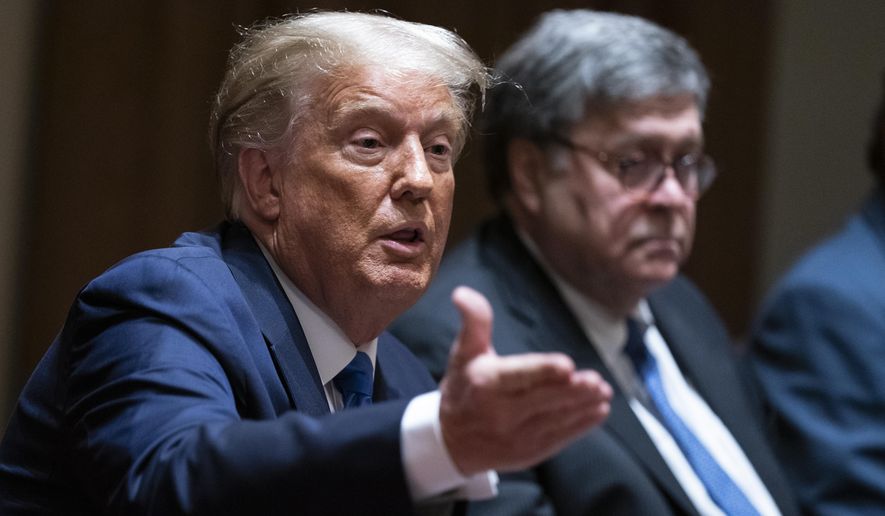Attorney General William Barr took a special interest in how political appointees in the Obama State Department became involved in debriefing dossier writer Christopher Steele as he was selling his Trump-Russia conspiracy claims during the 2016 election, newly disclosed documents show.
At the time, late September and October 2016, Mr. Steele, an FBI source, was examining a number of avenues to propel his allegations about candidate Trump into the limelight before the Nov. 8 election. His dossier claims would end up discredited.
Mr. Barr made the request in May 2019, the month he appointed U.S. Attorney for Connecticut John Durham to investigate how the FBI opened and conducted its probe into Mr. Trump and his campaign.
A May 15, 2019, email, with the subject line “AG Barr Request,” is attached to a reply from the FBI. The reply contains email threads between Kathleen Kavalec, then-deputy assistant secretary of state for Russia, and FBI agents assigned to “Crossfire Hurricane,” as the probe was called.
At one point in the emails, an FBI official pushed back against “political rival” Ms. Kavalec’s desire to be briefed on what Mr. Steele was telling the bureau.
Overall, the emails show the determination of Mr. Steele, a former foreign intelligence agent, to bring down the Trump candidacy by trying different avenues, be it the news media, the FBI or the State Department.
DOCUMENT: Grassley-Johnson FBI/State Department documents
What Mr. Barr did with the information is not disclosed in the documents obtained by Senate Finance Committee Chairman Chuck Grassley, Iowa Republican, and Homeland Security and Government Affairs Chairman Ron Johnson, Wisconsin Republican.
Two issues were discussed by Ms. Kavalec and FBI agents: What Mr. Steele told Deputy Assistant Secretary of State Jonathan Winer when they met in September 2016 and what Mr. Steele told the FBI when bureau officials flew to Rome for an Oct. 3 debriefing.
Ms. Kavalec wrote to Stephen C. Laycock, then a counterintelligence section chief, on Sept. 29 disclosing she knows all about Mr. Steele’s upcoming meeting in Rome. Ms. Kavalec and Mr. Laycock had met earlier in the day at the State Department.
“Regarding the issue we discussed at the end of our meeting, Toria [Assistant Secretary of State Victoria Nuland] inquired and was told the source of the information, from Orbis Security, is planning to meet on Monday, October 3, with [redacted],” Ms. Kavalec wrote. “This source also said some folks from FBI are flying out to meet him. Apparently the source and [Mr. Winer] know each other from New York. I hope that is helpful in putting the pieces together!”
Mr. Steele heads Orbis Business Intelligence, a private research firm in London.
The next day, Mr. Laycock filled in Crossfire Hurricane leader Peter Strzok, who wanted the report written by Mr. Winer, identified only as the “source.”
The follow-up was a Sept. 30 FBI email exchange, in which all names are redacted, stressing how important it was to see the Winer notes that he handed to Ms. Nuland.
“You know how much of a priority this is, so any information real-time is greatly appreciated by the CD [counterintelligence division] FO [field office],” the email reads. “We have folks deploying to interview this guy [Mr. Steele]. They are looking for all they can get specifically, the original document. Thanks.”
Next, the FBI official told Mr. Strzok and others that Ms. Nuland had the notes, but Mr. Winer [not identified as such] promised not to share.
In October a separate email thread started over how the Rome meeting with Mr. Steele went.
“Toria [Ms. Nuland] is back from Moscow and just asked me how the meeting [redacted] went earlier this week,” Ms. Kavalec wrote to Mr. Laycock. “Is there anything you can share? Happy to talk secure if that would be convenient. Best, Kathy.”
At this point, an unnamed writer chimed in, telling Mr. Laycock it was none of State’s business, especially since the FBI was investigating a “political rival.”
“I also don’t know how its State’s business or how they think it appropriate to ask about a potential FBI source meet on such a politically charged subject,” the official wrote. “That is sending flags up.”
“I think [redacted] will have the best approach and idea on how to give a non-committal answer,” the official wrote. “Obviously she knows we had a team travel [redacted] and the source’s admission, but I don’t think we owe her any type of read-out and a political appointee should know better than to ask about a potential investigation of a political rival. I think we leave it at a meeting occurred, the FBI collected information.”
After the election, the FBI created a Nov. 16, 2016, “electronic communication.” Its two paragraphs were titled “US Department of State employees aware of FBI relationship with Steele.”
Ms. Kavalec continued her search for Steele information by meeting with the man himself at the State Department on Oct. 11, 2016. Notes from the meeting were not turned over to congressional investigators. They surfaced in a Freedom of Information Act (FOIA) lawsuit against the FBI by Citizens United, led by David Bossie.
In all, the State Department had three senior Obama political appointees obtaining Mr. Steele’s anti-Trump material: Ms. Nuland, Mr. Winer and Ms. Kavalec.
• Rowan Scarborough can be reached at rscarborough@washingtontimes.com.




Please read our comment policy before commenting.